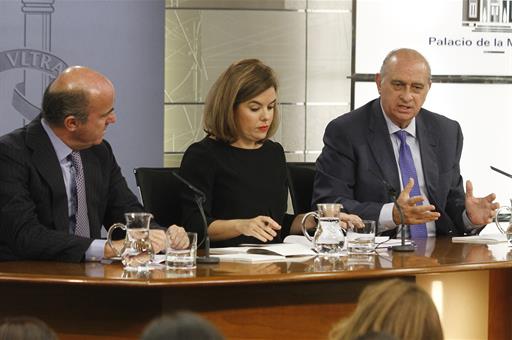Council of Ministers
Government of Spain approves Law on Promoting Business Finance
Council of Ministers - 2014.10.3
Moncloa Palace, Madrid
The Council of Ministers approved, for submission to Parliament, the Draft Law on Promoting Business Finance, which aims to improve the financing tools made available to companies, especially SMEs.
The Vice-President of the Government, Soraya Sáenz de Santamaría, said that "this will make it easier for SMEs, which represent the majority of our business fabric and job creation potential, to overcome the problems stemming from a lack of financing".
She explained that the objectives for the law are "to make bank financing more flexible and more accessible, lay the groundwork for strengthening other sources of non-bank financing and strengthen the supervisory powers of the Spanish Securities Market Commission".
Along the same lines, the Minister for Economic Affairs and Competition, Luis de Guindos, recalled that companies in Spain obtain 75% of their financing from banks. He therefore believes it important to diversify the sources of financing so as to reduce dependency on the banks.
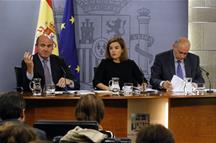 Pool Moncloa/Acceso libreThe regulations approved on Friday state that any credit entity wishing to reduce the financing it provides to an SME that is fully up-to-date with its payment obligations will be required to notify the SME of said decision three months in advance. Luís de Guindos stressed that the SME will be entitled to request its payment history from the bank, including a credit score.
Pool Moncloa/Acceso libreThe regulations approved on Friday state that any credit entity wishing to reduce the financing it provides to an SME that is fully up-to-date with its payment obligations will be required to notify the SME of said decision three months in advance. Luís de Guindos stressed that the SME will be entitled to request its payment history from the bank, including a credit score.
The minister also announced that the law establishes a "faster, more effective and more flexible" regime to govern mutual guarantees. Furthermore, the regulations extend the supervision and solvency criteria applicable to banks to include all financial establishments issuing credit.
Luis de Guindos said that the legal system governing securitisations is being reformed in order to simplify them and make them more transparent. "The underlying asset used to be based on mortgage debt. We are trying to encourage the underlying asset to also be based on loans to SMEs".
In order to foster new financing instruments, the minister said that the Alternative Stock Market (Spanish acronym: MAB) is being strengthened. To that end, increased flexibility is being added to the requirements for companies wishing to move from the MAB to the official Spanish Stock Market. Hence, when the share capital of a company listed on the MAB reaches a threshold of 500 million euros, it will automatically be required to transfer to the Spanish Stock Exchange.
In this regard, the Minister for Economic Affairs and Competition announced that the Audit Act being drafted by his department contains a requirement for companies listed on the MAB to be audited by companies with a certain level of standing and comply with a series of conditions. "Those which are referred to as public interest companies", he said.
The draft law approved on Friday will also help limited liability companies issue fixed-income securities. It also strengthens the supervisory, inspection and penalisation powers assigned to the National Securities Market Commission (Spanish acronym: CNMV).
"Crowdfunding"
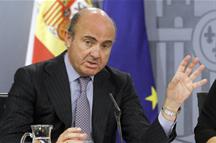 Pool Moncloa/Acceso libreFor the first time in Spain, regulations have been drafted to govern the Internet platforms that promote so-called participatory funding or crowdfunding. "We are establishing regulations for these platforms to ensure they are transparent, provide or facilitate a connection between investors and the investment projects in such a way for them to require authorisation and supervision by the CNMV with support - especially in terms of loan activity - from the Bank of Spain", said Luis de Guindos.
Pool Moncloa/Acceso libreFor the first time in Spain, regulations have been drafted to govern the Internet platforms that promote so-called participatory funding or crowdfunding. "We are establishing regulations for these platforms to ensure they are transparent, provide or facilitate a connection between investors and the investment projects in such a way for them to require authorisation and supervision by the CNMV with support - especially in terms of loan activity - from the Bank of Spain", said Luis de Guindos.
The minister explained that a distinction is made between two different types of investor: accredited and non-accredited. Accredited investors are institutions, companies with over one million euros of assets, a turnover of two million euros or 300,000 euros of equity and any individual or legal entity whose income level exceeds 50,000 euros per annum or have an asset value in excess of 100,000 euros and expressly request to be treated as such. The rest are non-accredited investors and will not be permitted to globally invest more than 10 billion euros per year in projects that do not exceed the 3,000 threshold.
Luís de Guindos argued that 'crowdfunding' is a new financing method that requires transparency and a series of controls so that "investors who may be less financially aware receive special protection".
The gas system
 Pool MoncloaThe Government of Spain approved a Royal Decree-Law to guarantee the safety of people, assets and the environment with regard to the storage of gas for the Castor project, located 22 kilometres from Vinarós (Castellón) at a depth of 2 kilometres.
Pool MoncloaThe Government of Spain approved a Royal Decree-Law to guarantee the safety of people, assets and the environment with regard to the storage of gas for the Castor project, located 22 kilometres from Vinarós (Castellón) at a depth of 2 kilometres.
The Vice-President of the Government explained that the regulations provide for the hibernation of these installations, which means a "ban on any extraction or injection of natural gas at the storage facility". Furthermore, the storage operation concession held by the company Escal UGS, S.L. has been terminated, accepting the waiver presented by the company and without prejudice to any liabilities that may derive from this situation.
Soraya Sáenz de Santamaría reported that a figure of 1.35 billion euros in compensation for the company has been accepted and will be paid by Enagás Transporte, which will assume responsibility for maintenance and operations at the installations during the period of hibernation.
The Vice-President of the Government said that the Council of Ministers will either end the period of hibernation if the technical studies advise such action or proceed with a safe decommissioning process.
Commemorating the victims of terrorism
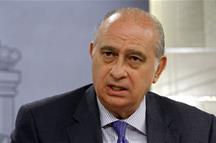 Pool Moncloa/Acceso libreThe Council of Ministers agreed to set up a committee of experts for the purpose of drafting a report within three months aimed at implementing a Centre for Commemorating the Victims of Terrorism.
Pool Moncloa/Acceso libreThe Council of Ministers agreed to set up a committee of experts for the purpose of drafting a report within three months aimed at implementing a Centre for Commemorating the Victims of Terrorism.
The Minister for Home Affairs, Jorge Fernández Díaz, recalled that the creation of such a centre is provided for by Law 29/2011, of 22 September, on the Recognition and Comprehensive Protection of the Victims of Terrorism, which was approved with "absolute consensus" at the end of the last legislature.
Jorge Fernández Díaz explained that creating a centre of this nature is a pioneering initiative in Spain, meaning a decision has been reached to seek "objective, qualified, inclusive and multi-disciplinary" advice from a committee, the setting up of which was agreed today.
The committee, which will be made up of 14 experts on both ETA and Jihadi terrorism, will be chaired by journalist Florencio Domínguez Iribarren.
Centre for Commemorating the Victims of Terrorism
The Minister for Home Affairs said that, besides being a legal mandate, implementing the Centre for Commemorating the Victims of Terrorism is "a duty that we all have to the victims of terrorism and to all future generations in Spain to ensure they know the truth about what happened in terms of the terrorist phenomenon" in the Basque Country and throughout Spain over a long period of time, as well as other forms of terrorism, from among which he highlighted Jihadi terrorism.
The creation of this centre, the headquarters of which will be based in Vitoria (at the historic building of the Bank of Spain, to be precise), will be supported by consensus and participation from all the institutions involved, as well as the ideas, suggestions and contributions offered by the victims themselves, because, as the minister said, "given its essential nature as an instrument for preserving the memory of the victims of terrorism, we intend for this project to become a long-standing institution capable of transcending the governments that may be in power at any given time, both national and regional".
Current affairs
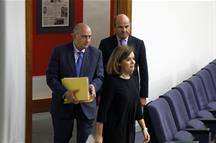 Pool Moncloa/Acceso libreIn response to questions about the latest steps by the Regional Government of Catalonia aimed at holding a referendum on sovereignty on 9 November, the Vice-President of the Government reiterated that Spain is a society based on the rule of law where the law, which everyone must follow, is the clearest expression of democracy and recalled that the courts, through the independent exercise of their powers, decide what is and is not legal.
Pool Moncloa/Acceso libreIn response to questions about the latest steps by the Regional Government of Catalonia aimed at holding a referendum on sovereignty on 9 November, the Vice-President of the Government reiterated that Spain is a society based on the rule of law where the law, which everyone must follow, is the clearest expression of democracy and recalled that the courts, through the independent exercise of their powers, decide what is and is not legal.
In this regard, she added that "nobody can twist democracy to suit their own ambitions", nor "can they unilaterally decide on what is legal; that is for the courts to decide". She also confirmed that the Government of Spain will act with the same "calm firmness" and will include the acts of non-compliance with the suspension decreed by the Constitutional Court into the appeals already lodged.
She also called on Artur Mas to state his final position on the suspension of the institutional campaign and the referendum process because the people "deserve serenity and tranquillity in this regard", said the Vice-President of the Government.
As regards the proposal from the Partido Socialista Obrero Español (PSOE) [Spanish Socialist Workers' Party] regarding the victims of violence against women, she said that "government after government" has set targets to eradicate this phenomenon through better instruments, "which must come from education and schooling" and "from generating confidence in our institutions".
Regarding another socialist proposal to increase the regime of incompatible activities for professional politicians, Soraya Sáenz de Santamaría highlighted the law regulating the exercise of senior officials approved by the current government, which regulates an already extensive regime of incompatible activities. At the same time, she advocated the need for people with training in various fields to "come and go" from politics, thereby avoiding a closed and endogamous situation, because "participation by the public enriches politics".
When asked about the irregular use of 'opaque' credit cards by executives of Caja Madrid, the Minister for Economic Affairs and Competition said that it was the Fund for Orderly Bank Restructuring (Spanish acronym: FROB) that reported this situation to the public prosecutor, which is the government agency that will collaborate on the ongoing judicial process and try to recover all possible funds. He also stressed that he understands the social uproar arising from such conduct because "the Minister for Economic Affairs is the first to be sickened by this behaviour". However, he added that he is convinced this is "a one-off case" and that this conduct was entirely stamped out in May 2012.





